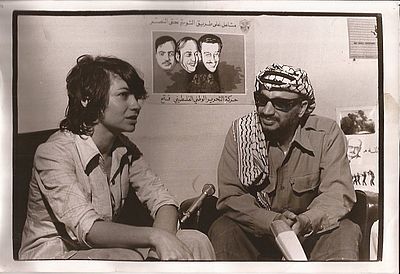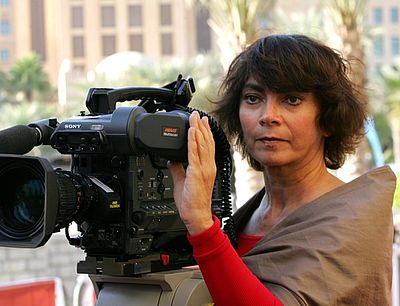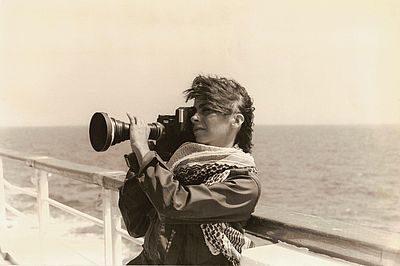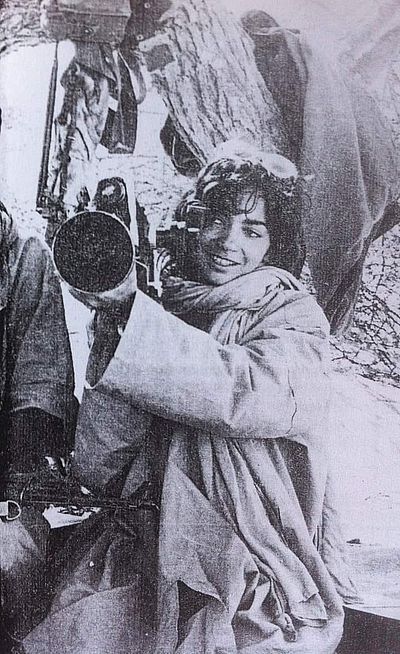CINÉ-CLUB - Jocelyne Saab et la résistance Palestinienne
June 10 | 18:30
Mobilität, Migration und räumliche Neuordnung
Séance Ciné-Club suivie par une discussion avec Mathilde Rouxel (Aix-Marseille Université / IREMAM-CNRS), spécialiste du cinéma arabe.
Quatre courts-métrages de Jocelyne Saab :
- PALESTINIAN WOMEN – 1974 – 11 min
Palestinian women, the often-forgotten victims of the Israeli-palestinian war, are here given a voice by Jocelyne Saab.
- THE REJECTION FRONT – 1975 – 10 min
When peace proves impossible, all means are justifiable in defence of a political cause. That’s what the suicide-commandos argue, operating on the frontier separating the Palestinian territories from the land they refuse to accept as Israel. Jocelyne Saab films these adolescents, between 16 and 20-years old, who train every day in a secret underground base to become suicide-commandos. BEIRUT, MY CITY – 1982 – 37 min
In July 1982 the Israeli army laid siege to Beirut. Four years earlier Jocelyne Saab saw her 150-year old childhood home go up in flames. She asked herself: when did all this begin? Every place becomes a historical site and every name a memory.THE SHIP OF EXILE – 1982 – 12 min
After living clandestinely in Beirut to escape the Israeli forces, the head of the PLO, Yasser Arafat, left Lebanon aboard the Atlantis for a new exile in Greece and then Tunis. He talks about his destiny and the future of the PLO.
Jocelyne Saab and the Palestinian Resistance
Jocelyne Saab was born in Beirut in 1948, the year of the Nakba, in a very mixed neighborhood of West Beirut, where Lebanese Muslims, Kurds and Christians live side by side. In 1968, she entered university and discovered the reality of the Palestinian refugee camps. Despite her desire to make films, she studied economics and went into journalism. Thanks to France 3, she became a war reporter, sent to Gaddafi's Libya, Saddam Hussein's Iraq, but above all to Sinai and the Syrian Golan in 1973, during the October War that shook Israel and enabled Egypt to recover part of the territories occupied by the Israeli army since 1967. In 1974, she made Palestinian Women about the struggle of Palestinian women in Lebanon: very classical in form - Saab had finally learned to make images in the canons of French television - the film was nevertheless judged too militant and was censored. From then on, she decided to work on her own. Palestinian armed groups put their trust in her: she was the first journalist to document a Palestinian training camp, the first to practice suicide commandos. The Rejection Front (1975) was one of the scoops that propelled her career. She continued to cover the conflict until the Israeli invasion of Lebanon in 1982 and the siege of West Beirut, aimed at eliminating PLO leaders. Staying in Beirut during the siege, Jocelyne Saab directed Beirut, my city (1982), a political ode to life that documents the Israeli occupation of Beirut right up to the despair of the Palestinians' departure, which ended their presence. Arafat asked her to document his departure from Lebanon on the Atlantis, the boat that would take him to Greece:The Ship of Exile(1982) is the film-keeper of these images, and was the last documentary made in Beirut by the filmmaker. For her, the departure of the Palestinians from Lebanon marked the end of a world, at the cost, for all too costly, of utopia.
Contact
Ophélie Mercier
Ophelie.Mercier ( at ) ugent.be
Location
Sputnik KinoHasenheide 54/5th
10967
Berlin



